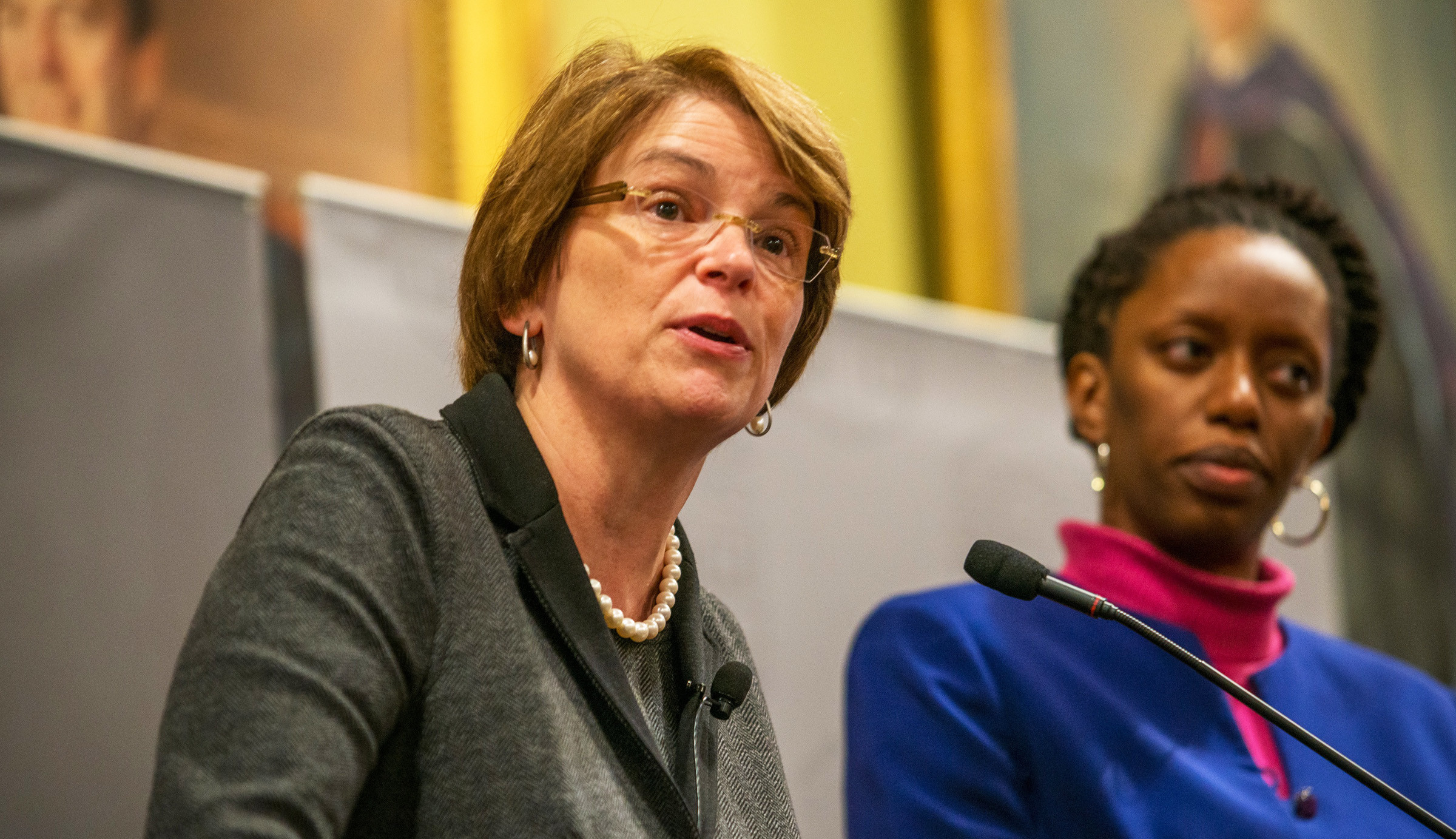Unpacking racial disparities in health
Brown President Christina Paxson, Dr. Nicole Alexander-Scott, pursue dialogue around economics of racial health care disparities in the nation, Rhode Island
When asked about how to integrate the social determinants of health into quality metrics, a primary care physician said: “The more I think about it, the more I like voter participation as the single unifying metric. At the end of the day, a health care system exists to allow citizens equal participation in democracy.”
PROVIDENCE – All across America, college campuses have become lightning rods for the ongoing national conversation about race, diversity, disparity and inequity.
At Princeton, students have demanded that the legacy of Woodrow Wilson’s name be stripped from buildings because of his overt ties to segregation and racist policies.
At the University of Missouri, in response to a number of racist incidents, students, including the football team and its coach, forced the resignation of the president.
In Amherst, the mascot of the Lord Jeffs, named after the founder of the school, Lord Jeffrey Amherst, has been dropped from the athletic teams, because of his role in spreading small-pox-laden blankets to neighboring Native Americans in Western Massachusetts to wipe them out.
So, it was rather remarkable when Brown University President Christina Paxson stepped to the podium to give the 2015 Levinger lecture, “Unpacking racial health disparities,” before a packed Sayles Hall on Nov. 16.
Just as remarkable, perhaps, was that Paxson invited Dr. Nicole Alexander-Scott, the director of the R.I. Department of Health, to share the podium with her, and to talk about efforts to promote health equity in Rhode Island as a public health priority.
[Two days before the lecture, an alleged assault by campus security on a visiting Dartmouth student who was attending a Latino student conference had prompted Paxson to apologize for the incident in a campus-wide email. That apology made the front pages of The Providence Journal; Paxson’s lecture, for whatever reason, did not.]
Structural disparities
Paxson, in scholarly academic fashion, laid out the facts and figures to make her comprehensive case about the persistent, significant and pernicious gaps in health disparities that exist between blacks and whites in America.
Paxson examined the morbidity for specific conditions – arthritis, heart conditions, stroke, high blood pressure, diabetes and breathing disorders – and detailed the large gaps between blacks and whites, not just in incidence, but when the onset of these conditions occurred, and the way in which they limited opportunities for work and wealth.
Paxson presented the stark differences between the total wealth for an average black household and the average white household in 2013: $11,000 compared to $190,000.
Most striking were her conclusions: that we cannot “educate our way” out of the disparities, nor will improved access to health insurance under the Affordable Care Act solve the persistent, structural racial disparities.
The take-away when you look at the data and studies, Paxson continued, was that the racial health disparities were a result of a complex stew of lower wealth, higher stress, greater discrimination, and lower economic opportunities.
“I don’t think we are really going to solve this problem until we dismantle structural barriers to social and economic opportunity,” Paxson said.
Student response
A number of the Brown students in attendance used the opportunity to voice their anger about what they saw as problematic racial disparities at Brown itself, including issues around health insurance and the lack of diversity in faculty.
Paxson responded by saying she had committed to double the number of faculty members from historically under-represented groups, stressing the importance of increasing diversity among Brown’s faculty.
Paxson also said that the entire campus community will have an opportunity to discuss Brown’s plan for diversity and inclusion when it was released in draft on Nov. 20.
Alexander-Scott, while applauding the importance of speaking out, also suggested that the students recognize that the leaders at Brown were receptive, compared to her experience as a student at Cornell.






